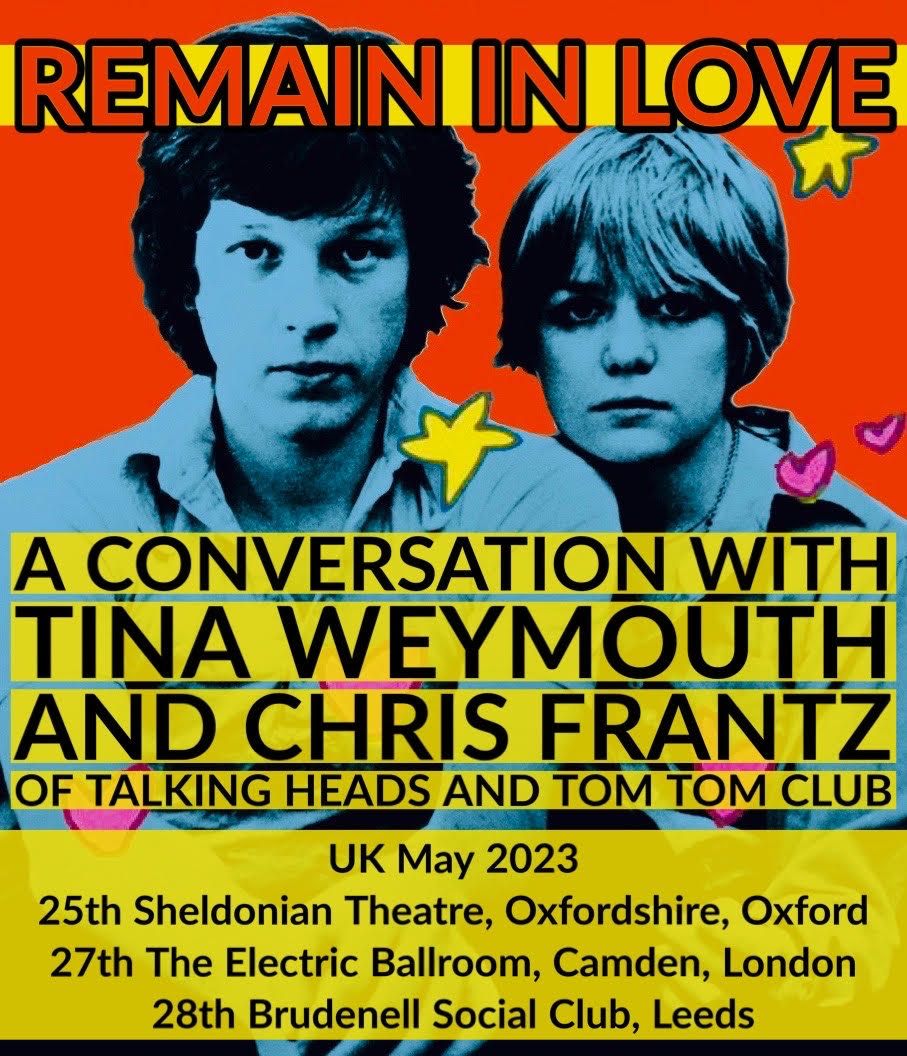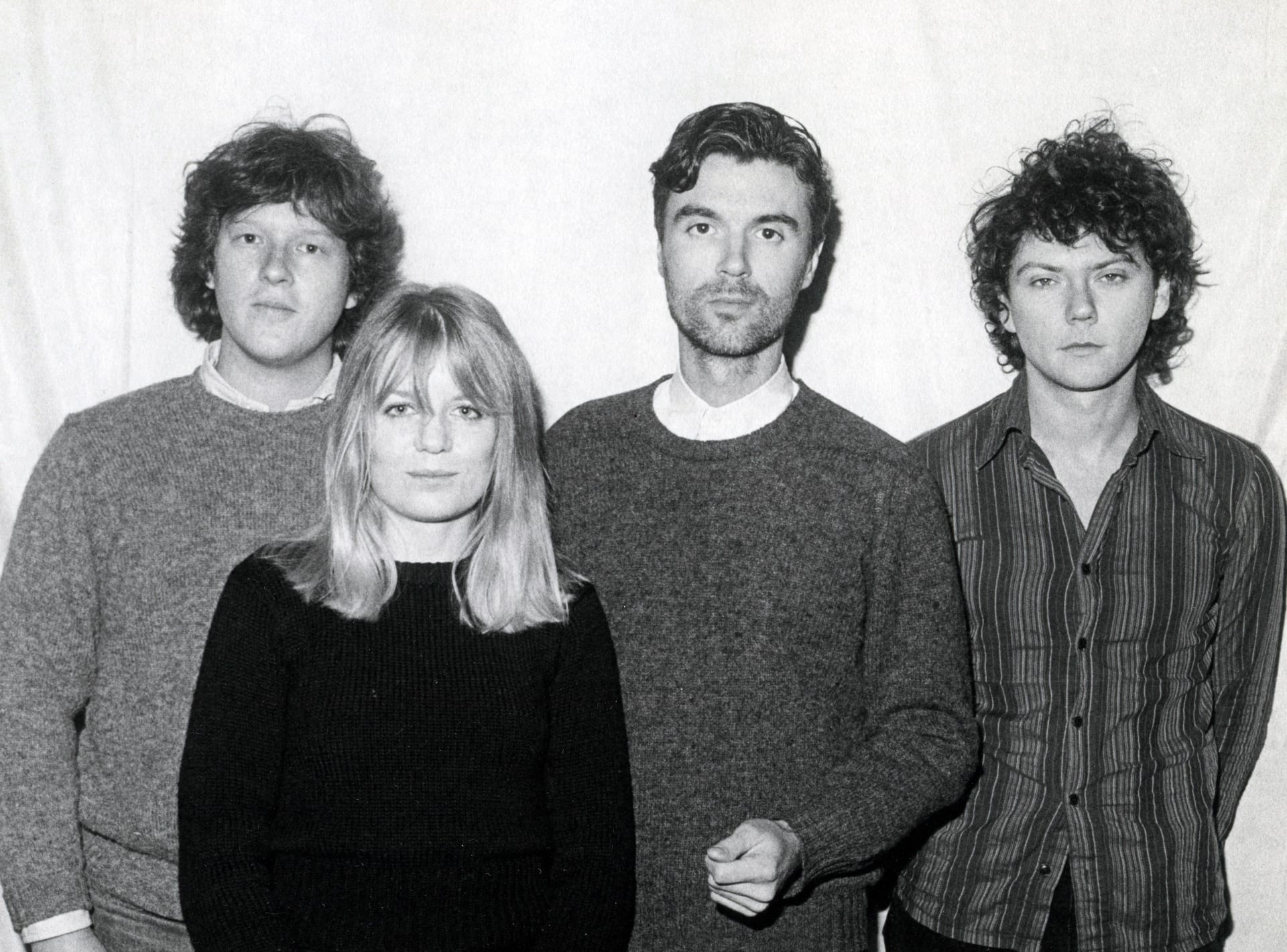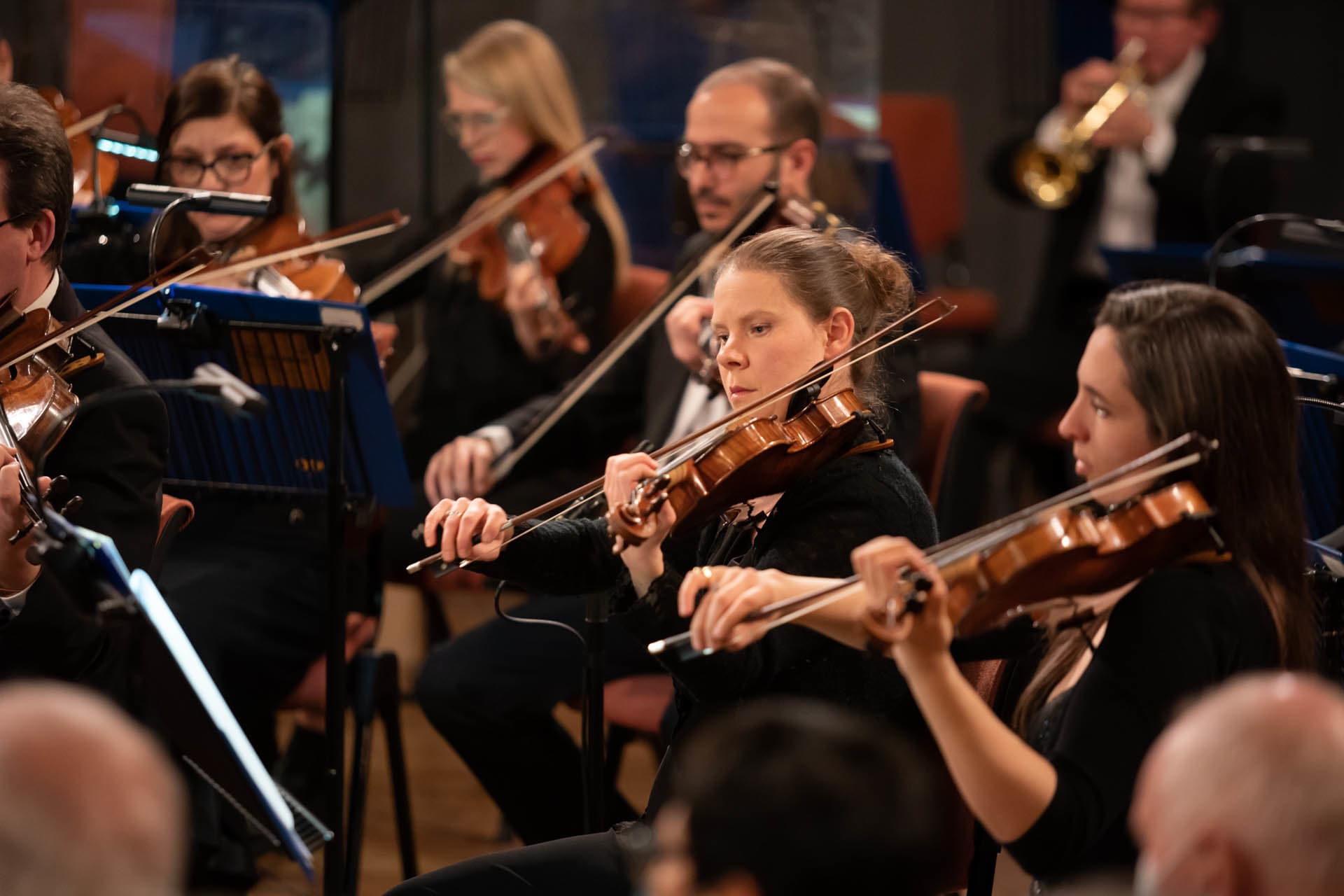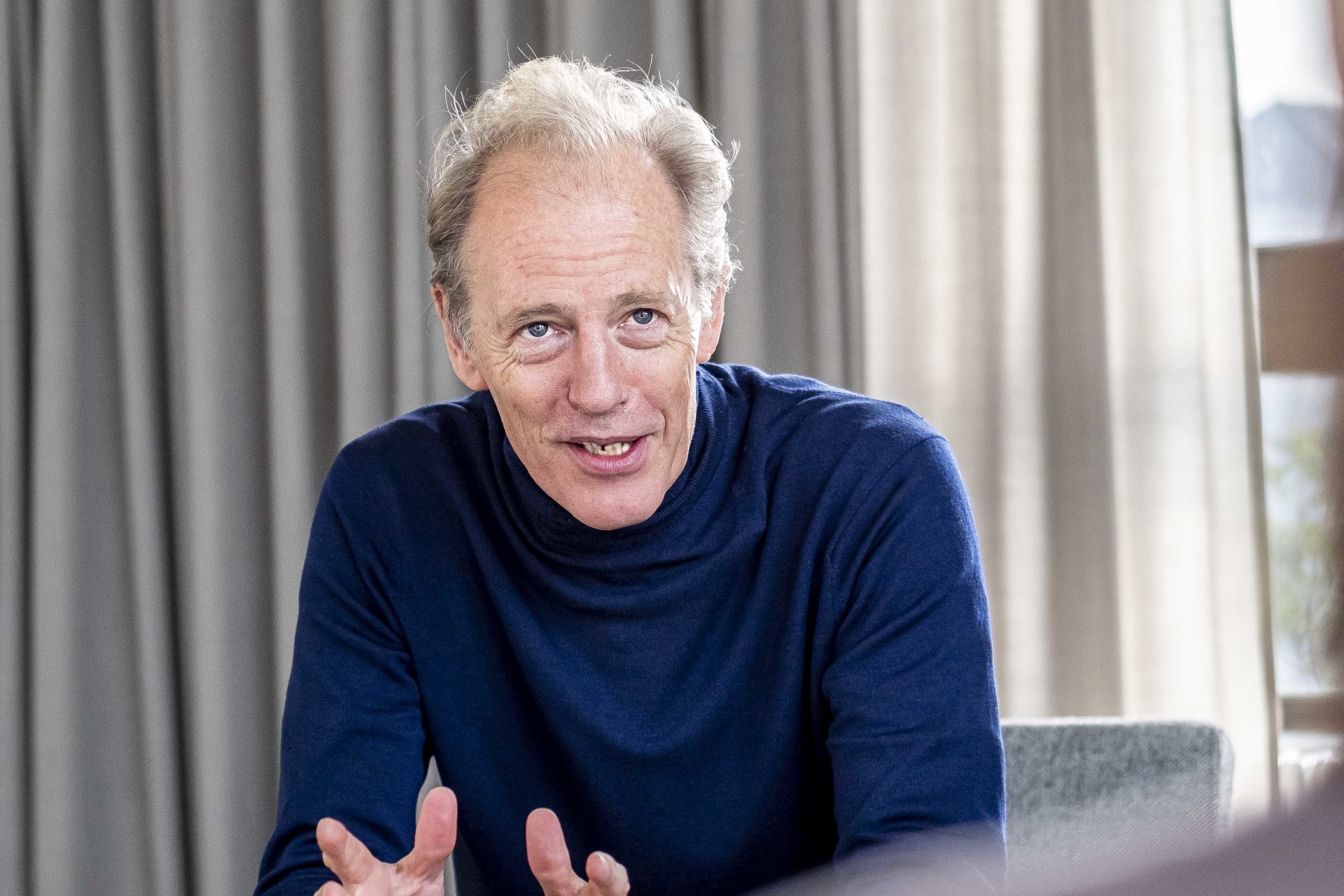Jill Rayner describes Tina Weymouth and Chris Frantz of Talking Heads as ‘always the coolest, too cool for school’. In fact, she’s something of a superfan so when we heard that their speaking tour, Remain in Love, would bring them to Oxford, Jill got on the phone to Chris to find out more.
It genuinely is an honour so thank you for accepting the interview. Is this your first speaking tour?
Yeah, it is. This gentlemen sent us an email saying would you like to do a little speaking tour of the UK and we said why not? It’s at the end of May which I know from experience can be a very beautiful time in the UK.
It’s the best. And the Sheldonian is the most beautiful place ever.
Right. I can’t confirm yet who the moderator will be. I have a good idea who it will be, but I haven't been given permission to confirm it yet.

You’re going to tell me David Byrne is going to step up, aren't you.
That would be good, wouldn't it?
I don’t know. He’s a complex character, I’m sure. I’m sure that was it life changing but I’m guessing being in Talking Heads was only a period of time in the overall scheme of your life wasn't it?
Being in Talking Heads?
Yeah.
Well, it was pretty major for me, I must say. Tom Tom Club also of course but Talking Heads – some people would say that that was the best part of my life or the best years of my life. My life is great now, I’m doing fine thank you. Keeping busy and doing interesting things and also I’m a great believer in taking time off to enjoy the fruits of your labours; you know, like there’s nothing wrong with a beautiful long extended vacation.
You started off as a painter didn’t you?
Yes, Tina and I both, and David studied at the Rhode Island School of Design which is regarded by many as the premier art school in America. That’s where we met, and we both studied painting. David dropped out after the first year, but he hung around the campus and he and I had a little band together.
Did I read that was a soul band?
Prior to that I was in a soul band called the BrotherHood and it wasn't a blue-eyed soul band – it was a brown-eyed soul band and that was a lot fun but we only did one show and then broke up. So I started a new band, this time with David Byrne and some other friends. The intention was to play at parties and shows to would amuse our friends, which is what we did. We were a cover band we played things by The Who and The Velvet Underground – really good songs – but me and David thought maybe we should try write a song of our own, an original song, see how that goes.
Tina and I shared a painting studio at the Rhode Island School of Design and one day there was a knock on the door and there was David with his guitar, and he said I’ve got a song that I’ve started and I’d like you to help me work on it. He sat down with his little acoustic guitar, which was really cheap with paint drips on it, and he said I can’t seem to face up to the fact I’m tense and nervous and I can’t relax and I said ‘whoa, that sounds great’. Then he did the chorus of Psycho Killer and he said well I need some more verses and I need a middle section and I’d like the middle section to be in a foreign language to connote that the narrator of the song was having some sort of psychotic episode so it switches to another language. I thought that was a great idea and Tina's mother was French and they always spoke French in the home so Tina could write the middle 8 in French. Tina just sat down and banged it out in a very short period of time.
You know when we first went to France people said, those French words in Psycho Killer nobody speaks like that. That’s like from Napoleon’s time. Anyway, then I wrote a couple of verses and then we played it, we rehearsed it, and we played it in front of an audience, and it got like a better reaction then any of our covers songs did. People had never heard it before they just immediately liked it and so we thought we should do more and that lead to us writing many more songs together. At a certain point David said if I’m going to be singing the songs I want to also be writing the lyrics, but it was Psycho Killer that was really the spark that ignited Talking Heads.
I can remember the first time I heard it, and it was just unlike anything I’d heard before. It was at the stage of my life when I listened to Leonard Cohen and wanted to be super cool and here was this music that was so arty but also made you want to dance which was quite a contradiction.
That’s true. We always felt that dance music, reggae music, all those forms of music that make you want to dance were very important. During that period of time many people said disco music was crap but we didn’t feel like that way – we liked it. I mean not every single disco song but there were some great, great songs during that era that were disco. We used to go to the discotheques and sometimes you had to sort of pretend to be gay to get in.
Absolutely. So looking at the legends that were mentioned in your book there’s everyone isn’t there? Didn’t you live near William Burroughs?
Yes, we lived two blocks away. He lived in a basement of a building. They called it the bunker. I was never in it, I was never invited in.
That might have been a good thing in hindsight.
He would entertain people like Patty Smith and Joe Strummer, but he never invited us in. That was the same building were Mark Rothko had his studio and Mark Rothko was long gone by the time we lived there but William Burroughs was still there.
Was it an area that was already super cool when you moved in?
It was super cool but it was very desperate. Now it’s gentrified but it took a long time – like 30 or 40 years from after we lived there. There were those very desperate alcoholics that we used to call the bums, you know homeless people, and then drifters and pick pockets and thieves. On our street there were the $5 hookers. They were nice people but they were pretty desperate too.
You know the big thing that’s stuck me about everything I’ve read about you is your partnership with Tina because it is a partnership, isn’t it? Do you think that’s a secret of a marriage?
Well you know, it’s something that you have to work at. You can’t take each other for granted. We celebrated Tina's birthday last night in New York and we got together with some old friends, they've all been married a long time also. You have to do nice things for each other and cheer each other up and try to make each other laugh. There’s a lot to be said for having a good sense of humour.
What sort of music type do you listen to these days?
I love the new kids like Wet Leg – I adore Wet Leg. They’re from the Isle of Wight, so not too far away from you. Theres another band I love called Khruangbin. It’s a Thai word, I think it means aeroplane but I dig them, they’re nice and funky. I feel very fortunate to have lived in what many people consider to be the golden age of music. I don’t know that we’re still in the golden age, but I don’t want to sound like an old fart either.
I don’t think you do. So who influenced you when you were growing up.
I guess Bob Dylan. The Beatles definitely; I was a young drummer, so I guess you could say Ringo. Then the Stones came, and I loved the Stones. I loved Charlie Watt’s style playing drums.
But also the way he dresses? He was always such a sharp guy.
He was impeccable. Then I loved James Brown when I went to school in Virginia I was introduced to James Brown and The Four Tops.
Have you ever met one of your heroes face to face?
Oh sure.
Is there any of them who you were overwhelmed by – like I am at the moment?
I was definitely star struck by Ringo. It wasn't much of a meeting, we were in Montreal, and we were in the same hotel. It was a posh hotel and I got in the elevator, we were descending and the doors opened and Ringo walked in. I said ‘oh wow Ringo! Good morning’ and he looked at his watch and – I think this was before he quit drinking, kind of grumpy – he said ‘it’s not morning, its afternoon already’ and the doors opened and he split.
Well, at least you've got that memory. So, what should people expect from your speaking tour?
It’s going to be a very informal conversation; a bit like were having now. There will be a moderator to keep things moving and he or she will probably have some questions that they feel we should answer. Then we’re going to turn it over to questions from the audience. It will be a nice evening.
It sounds amazing. Chris, was writing your book something you'd always wanted to do?
Well, people had suggested to me that I should be writing a book for a long time and I just kept procrastinating. One day I woke up and I said, you know what I’m losing a lot of friends this year, my old friends are dropping like flies so maybe while I can still remember things, I’ve been blessed with a good memory thank goodness, and while I still have it in me I should go ahead and write a book. I feel it’s a good memoir. People have told me that they really enjoyed it and that it was fun for them to read, so that’s good.
The love you have for Tina shines all the way through it.
Definitely. Because of the pandemic I was never able to do a proper book tour, so it is great that we get to come over to the UK and do a little mini book tour.
You can indeed. Going forward, is there anything else up your sleeve that you going to shock us all with?
Well, I’m going to be working on another book, and at the moment we’re just waiting on an engineer. We’re going to get started on some new recordings, Tina and I, and we'll see what happens. We haven't made any new music for a number of years now, and we started thinking well it’s not like the world is breaking down our door for a new record or anything like that, but I think we still have a couple of good songs in us. We're gonna see what we can do.
Remain in Love, A Conversation with Tina Weymouth and Chris Frantz will be at the Sheldonian Theatre, Oxford on Thursday 25 May ticketsource.co.uk.
For more information, visit talkingheadsofficial.com









